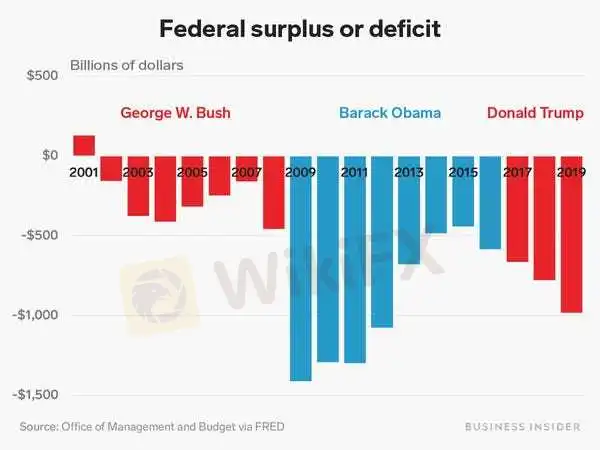简体中文
繁體中文
English
Pусский
日本語
ภาษาไทย
Tiếng Việt
Bahasa Indonesia
Español
हिन्दी
Filippiiniläinen
Français
Deutsch
Português
Türkçe
한국어
العربية
The federal deficit jumped 26% to $984 billion for fiscal year 2019 - Business Insider
Abstract:The rising deficit under Trump is fueling fears the government may have less room to act in a future economic slump.
The federal deficit swelled to $984 billion in 2019, a 26% jump from last year, despite the nation's sustained economic growth.Deficits tend to fall when the economy is growing, given lower unemployment rates which helps bring in more tax dollars to government coffers and lower spending on public aid.The mounting deficit is generating anxiety among budget experts who fear the government will have less room for emergency spending in a future economic slump.President Donald Trump campaigned to wipe out the nation's federal debt within eight years, but has piled onto it instead with the 2017 GOP tax cut as well as ramped-up defense spending.Visit Business Insider's homepage for more stories.The federal deficit swelled to $984 billion in fiscal 2019 — a 26% jump from last year — despite the nation undergoing another period of sustained economic growth.This year's deficit figure represents the highest amount since 2012, according to the Treasury Department, when the nation was still recovering from the 2008 financial crisis.Deficits tend to fall when the economy is growing, given lower unemployment rates which helps bring in more tax dollars to government coffers and lower spending on public aid. And the mounting deficit is generating anxiety among budget experts who fear the government will have less room for emergency spending in a future economic slump.“This is the first time in our history that we are seeing a boom in the economy at the same time deficits are rapidly rising. It's alarming,” Marc Goldwein, a senior policy director of the Committee for a Responsible Budget, told the Washington Post.President Donald Trump campaigned to wipe out the nation's federal debt within eight years, but has instead piled onto it with the 2017 GOP tax cut as well as ramped-up defense spending. Its a stark shift for Republicans, who tend to be thrifters with a Democrat in the White House but become big spenders when they're in power.“Republicans talk a good game about deficit reduction when they're out of power,” a conservative economist and senior Manhattan Institute fellow Brian Riedl previously told Business Insider. “But once they win the White House, they prioritize the more popular policies of cutting taxes and increasing defense spending.”As shown in the graph below, President Barack Obama also ran up large deficits, though to stave off the nation's economic collapse during the Great Recession. He cut deficits through his later years in office, but Trump has added onto it for three years.

The federal deficit from 2001 to 2019.
Andy Kiersz/Business Insider
Treasury Department data for 2019 shows the government spent $4.4 trillion on its programs while drawing in $3.5 trillion in tax dollars and other revenue — leaving the $984 billion hole in its finances.Experts say 2017 GOP tax law has been a driver of the ballooning deficit. The Congressional Budget Office projected the law would increase the annual deficit by about $200 billion over a decade, or to nearly $2 trillion after interest payments are taken into account.The Trump administration's tax cut has helped slide tax revenues instead of pay for itself in the form of robust economic growth.
Disclaimer:
The views in this article only represent the author's personal views, and do not constitute investment advice on this platform. This platform does not guarantee the accuracy, completeness and timeliness of the information in the article, and will not be liable for any loss caused by the use of or reliance on the information in the article.
Read more

US jobless claims preview: Economists expect another week of decline - Business Insider
"If the current rate of decline continues, claims will dip below 1M in the second or—more likely—third week of June," said economist Ian Shepherdson.
The coronavirus pandemic has cost LVMH's Bernard Arnault $30 billion - Business Insider
Before the coronavirus, luxury conglomerate LVMH was posting record-breaking revenues and sending Bernard Arnault's net worth soaring.

Job security concerns in tech jumped, especially at these companies - Business Insider
New research from the anonymous social media network Blind shows job concerns among employees at tech companies jumped 33% in a month.

US jobless claims preview: Economists see record UI beginning to slow - Business Insider
The surge in claims "should push the unemployment rate up to 17% in the April data, a new post-World War II high," wrote Brett Ryan of Deutsche Bank.
WikiFX Broker
Latest News
Japan to Take Action to Stabilize the Yen
Ringgit Remains Flat Amid Holidays, US Debt Concerns Loom
Taurex: Is it Safe to Invest?
Vietnamese Police Bust $1.2 Million Crypto Fraud Case
WikiEXPO Global Expert Interview: Loretta Joseph——Unlock the forefront of digital finance
XTB Receives Licenses to Operate in Indonesia & UAE
SEBI Bans Big "Finfluencers for Misleading Investors"
WikiFX New Year Bash: Chance to Win 70 USDT
Malaysia’s Securities Commission Enforces Ban on Bybit & Its CEO
Will Gold Shine Brighter in 2025?
Currency Calculator






